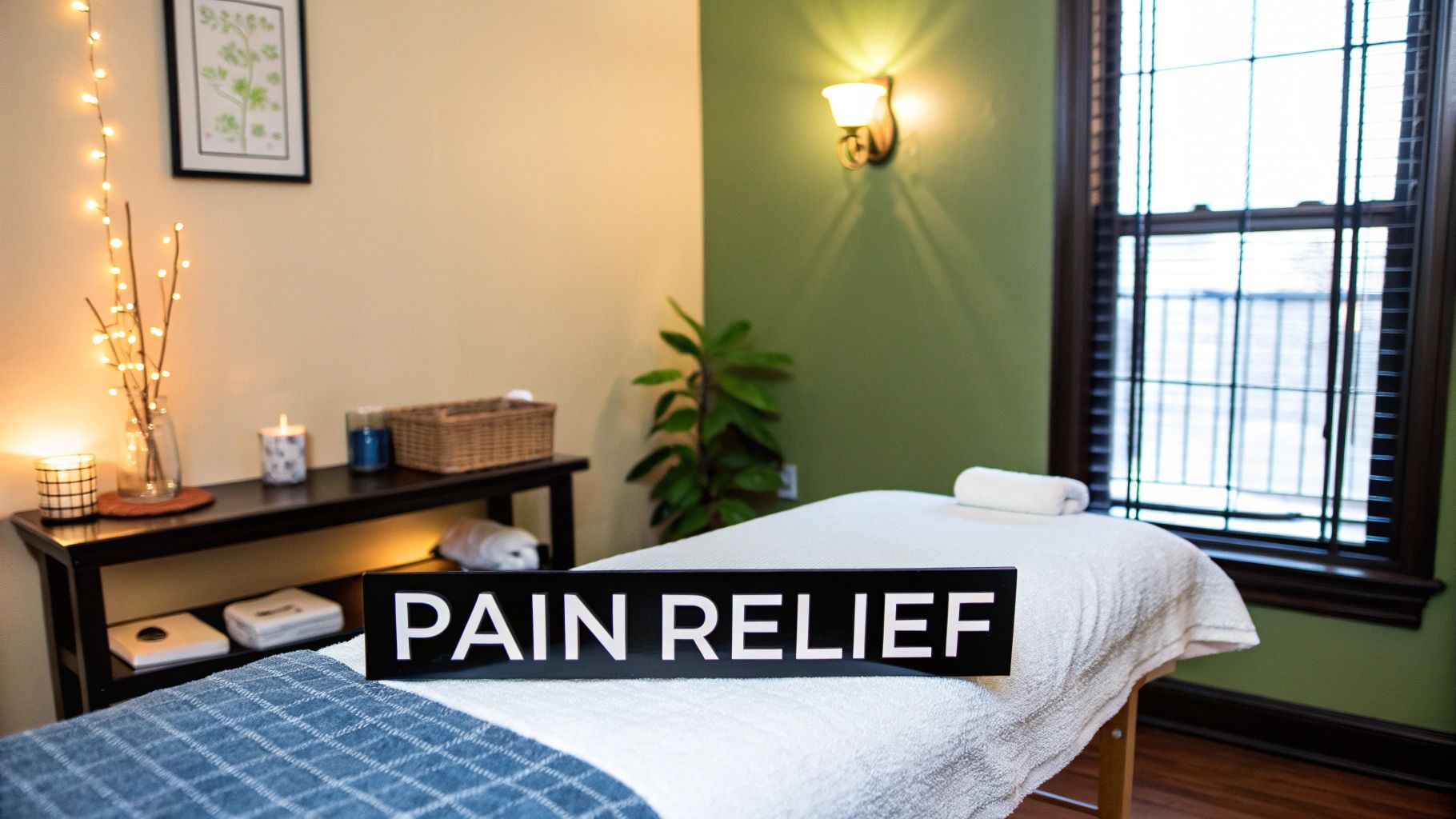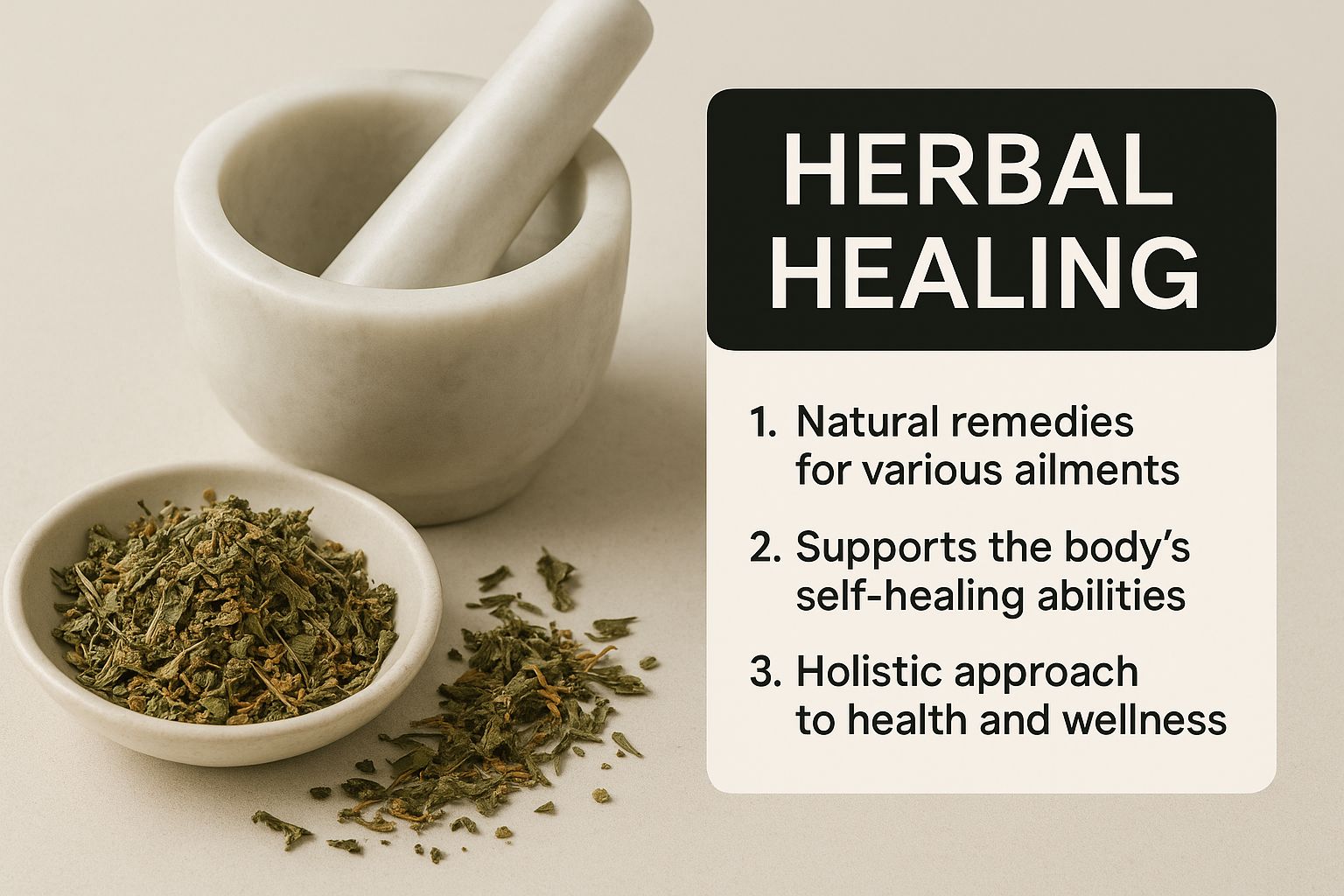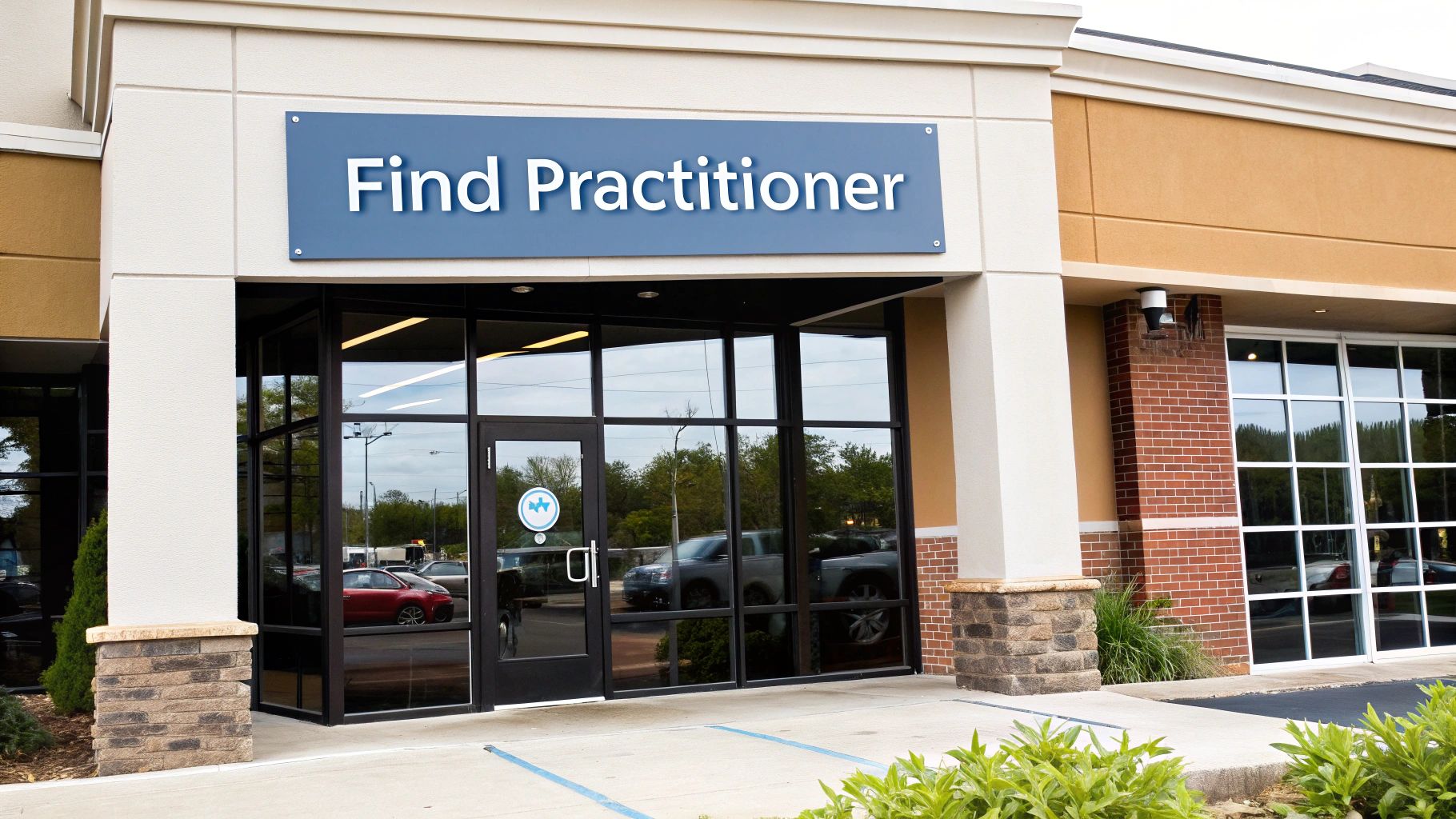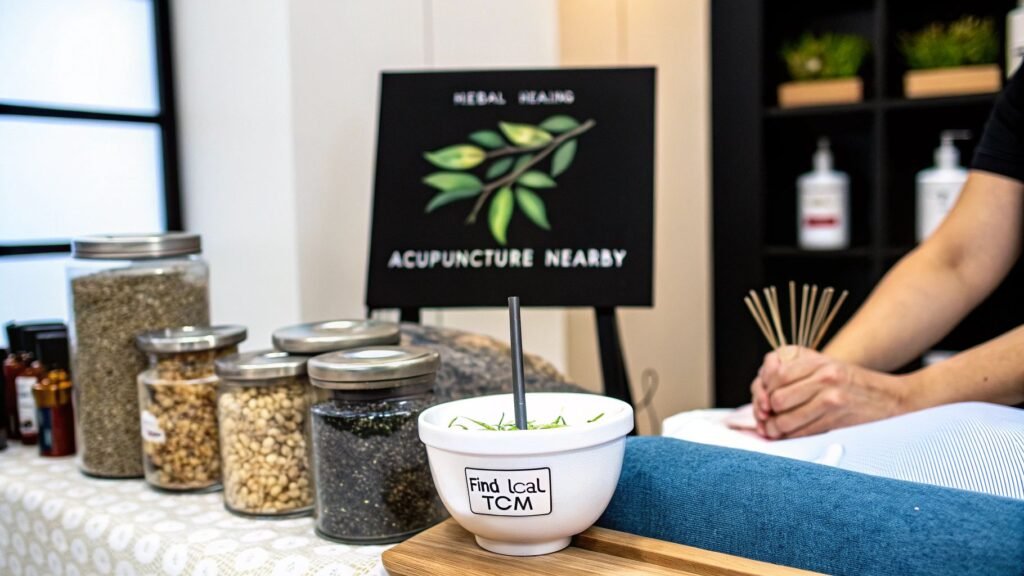When you type "acupuncture and herbs near me" into a search bar, you're not just looking for a pin on a map. You're starting a search for a partner in your health journey—someone who can provide truly personalized care using methods refined over centuries.
How to Find a Great Local Acupuncturist
It’s easy to feel a bit lost when you first start looking. But you're not alone. More and more people are choosing acupuncture and herbal medicine not as a last-ditch effort, but as a proactive way to handle everything from chronic pain and stress to complex hormonal issues.
The proof is in the numbers. The global acupuncture market was valued at roughly USD 26 billion in 2024 and is expected to climb to nearly USD 59 billion by 2031. This isn't just a niche trend; it shows a massive shift toward integrating these powerful therapies into modern healthcare. You can see the full breakdown in the market analysis from Biospace.
Why a Thoughtful Search is So Important
With this boom in popularity comes a wider selection of practitioners. That’s great news, but it also means you have to be more discerning. The goal is to find someone whose expertise and approach genuinely match what you need.
This guide is designed to give you a clear, step-by-step roadmap. I want to take the guesswork out of the process so you can feel confident in your choice.
My goal here is to demystify finding the right practitioner. I'll walk you through how to check credentials, understand different treatment styles, and ask the questions that lead you to high-quality, effective care.
Understanding the Bigger Picture
It’s also helpful to know that acupuncture and herbal medicine rarely exist in a vacuum. They are key parts of a much larger, cohesive system of health.
If you're new to this, getting a sense of how these treatments fit together can be incredibly valuable. Our overview of what Traditional Chinese Medicine is is a great place to start. This context will make it much easier to evaluate potential acupuncturists and understand their recommendations.
By the time you finish this guide, you won't just have a list of local clinics. You'll have the tools to choose a professional who can truly support you. Let’s get started.
Building Your Shortlist of Potential Practitioners

When you first type "acupuncture and herbs near me" into a search bar, the results can be overwhelming. The key is to move past that initial wave of information and start gathering names from sources you can actually trust.
A personal recommendation is often the best place to start. If a friend, family member, or even your primary care doctor has had a great experience, that’s gold. They can give you real-world insights into a practitioner's bedside manner, the clinic's atmosphere, and the results they experienced firsthand.
Look to Professional Directories
While referrals are fantastic, professional directories are your most reliable tool for casting a wider, yet still qualified, net. These databases aren't just random lists; they're curated by official organizations, meaning everyone on them has met specific educational and ethical benchmarks.
I always point people toward the National Certification Commission for Acupuncture and Oriental Medicine (NCCAOM). Their practitioner lookup tool is indispensable. It instantly filters out anyone who isn't nationally certified, giving you a solid, pre-vetted pool of professionals to start with.
Get Specific with Your Search
With a few names in hand, it's time to narrow things down. A general search is fine for getting started, but you'll get much better results by being specific about your needs. Think about why you're seeking treatment.
For instance, instead of a generic search, try plugging in something more targeted:
- "Acupuncture for fertility near me"
- "Herbalist for chronic pain management"
- "TCM for stress and anxiety relief"
This simple tweak helps you find practitioners who have a special interest or advanced training in the very thing you're dealing with. It’s the fastest way to connect with someone who truly gets your health concerns.
My best advice? Build your list from several angles. Start with a trusted referral, add a few names from the NCCAOM directory, and then see who pops up when you search for your specific condition. This cross-referencing gives you a much stronger, more reliable shortlist to work from.
The good news is that your options are growing. The global acupuncture market was valued at an impressive USD 53.05 billion in 2024 and is expected to skyrocket to USD 199.41 billion by 2032. This isn't just a niche practice anymore; it's a reflection of a massive public shift toward effective, non-pharmaceutical healthcare. You can see the full breakdown in these acupuncture market growth trends.
With more choices than ever, using a smart strategy like this helps you cut through the noise and zero in on the practitioners who are most likely to be the right fit for you.
How to Vet and Compare Local Acupuncturists
Okay, so you've got a list of names. Now comes the crucial part: figuring out which practitioner is truly the right fit for you. This is where you move beyond a simple search for "acupuncture and herbs near me" and start doing some real detective work. It’s how you’ll narrow that list down to your top two or three choices.
The very first thing I look at, without fail, is their credentials. These aren't just a jumble of letters after a name; they represent thousands of hours of training, rigorous exams, and a commitment to professional standards. Credentials are your first line of defense for safety and quality.
Decoding Practitioner Credentials
When you start browsing clinic websites, you'll see a few common acronyms pop up. Knowing what they mean is key to understanding who you're dealing with.
- L.Ac. (Licensed Acupuncturist): This is the big one. It means the practitioner is legally licensed to practice in your state. Getting this license involves meeting strict requirements, including passing national board exams and completing extensive clinical training.
- NCCAOM (National Certification Commission for Acupuncture and Oriental Medicine): Think of this as the national gold standard. An NCCAOM certification demonstrates that the practitioner has passed comprehensive exams covering the foundations of the medicine, acupuncture points, and critical safety protocols.
- Dipl. O.M. (Diplomate of Oriental Medicine): If you're specifically interested in herbal medicine, look for this. It’s an NCCAOM designation certifying expertise in both acupuncture and Chinese herbology. This tells you they have the full traditional toolkit at their disposal.
So, while the L.Ac. is the non-negotiable license to practice, certifications like Dipl. O.M. signal a deeper, nationally recognized level of expertise, especially with herbs.
A practitioner with deep herbal training, like a Dipl. O.M., can skillfully blend hundreds of different herbs into personalized formulas, which often look something like this.

This level of customization is what makes traditional herbal medicine so powerful.
To make this easier, here’s a quick reference table to help you sort through the credentials you'll see.
Acupuncturist Credentials At a Glance
| Credential | What It Means | Why It Matters |
|---|---|---|
| L.Ac. | Licensed Acupuncturist | This is the state-issued legal license required to practice acupuncture. It's the baseline qualification. |
| NCCAOM Certified | Passed national board exams | Confirms a national standard of competency in theory, safety, and practice beyond just state licensing. |
| Dipl. O.M. | Diplomate of Oriental Medicine | NCCAOM certified in both acupuncture and Chinese herbology. |
| Dipl. Ac. | Diplomate of Acupuncture | NCCAOM certified in acupuncture only. |
| Dipl. C.H. | Diplomate of Chinese Herbology | NCCAOM certified in Chinese herbology only. |
Seeing these credentials on a practitioner's website should give you a solid boost of confidence in their training and qualifications.
Reading Between the Lines of Online Reviews
After you’ve confirmed their qualifications, it's time to see what actual patients are saying. Don’t just glance at the star rating; that rarely tells the whole story. Instead, look for patterns in the comments.
Are people consistently talking about how the acupuncturist really listened to them? Do reviews mention feeling heard, respected, and involved in their own treatment? Those are the details that speak volumes about the clinic's atmosphere.
I also recommend looking for reviews from people with conditions similar to yours. If you're dealing with chronic back pain, seeing a detailed review from someone else who found relief for their back pain is incredibly valuable.
A great practitioner does more than just place needles. They create a therapeutic relationship built on trust and communication. Look for reviews that highlight not just the outcome, but the quality of the human connection.
Evaluating Clinic Websites and Specialties
A clinic's website is its digital storefront, and a professional, well-organized site is usually a good sign. Head straight for the "About Us" or "Meet the Team" page. This is where you can get a feel for their treatment philosophy and personal approach.
Does what they say resonate with you? Do they list any specialties, like fertility, sports injuries, or digestive health? Many acupuncturists pursue advanced training in specific areas. Finding someone who focuses on your main concern can be a game-changer.
Finally, pay attention to how they talk about their herbal medicine. Some clinics primarily use pre-made patent formulas, which are convenient. Others have an on-site herbal pharmacy and mix custom granular or raw herb formulas for each patient. If you're serious about using herbs, this distinction matters—it signals a deeper level of personalized care.
Navigating Insurance Coverage and Treatment Costs

Once you have a shortlist of promising practitioners, it's time to talk about money. Let's be honest, figuring out the financial side of things can be a major hurdle. Getting a clear picture of insurance coverage and treatment costs upfront is the single best way to avoid sticker shock and commit to a care plan without added financial stress.
The landscape is definitely improving. A huge turning point came in 2020 when the Centers for Medicare & Medicaid Services (CMS) started covering acupuncture for chronic low back pain. This was a massive signal of mainstream acceptance, and thankfully, it spurred many private insurance companies to broaden their coverage, too.
Clarifying Your Insurance Benefits
Before you even book that first appointment, your first move should be a call to your insurance company. This call can feel a bit daunting, so it helps to be prepared.
Grab your insurance card, find the member services number on the back, and have a list of specific questions ready. You’ll want to ask:
- Is acupuncture a covered benefit on my specific plan?
- Do I have a deductible I need to meet first? If so, how much of it is left?
- What will my co-pay or co-insurance be for each visit?
- Is there a limit on how many sessions are covered per year?
- Do I need a referral from my primary care doctor?
- Are there any restrictions? For instance, does my plan only cover treatment for specific conditions like chronic pain?
Jot down the answers (and the name of the representative you spoke with!). This information is gold when you're comparing your options. For a deeper dive, check out our guide on whether health insurance covers acupuncture.
Pro Tip: When you call your insurance, have the practitioner's NPI (National Provider Identifier) number handy. The representative can use it to verify if that exact acupuncturist is in-network, which almost always means lower out-of-pocket costs for you.
Discussing Costs Directly with the Clinic
What if the clinic you like isn't in your network, or if you don't have coverage? Don't worry. The next step is a straightforward conversation with the clinic about their self-pay rates. This is a completely normal and expected discussion, so don't feel shy about bringing it up.
Here are a few key things to ask the office manager or the practitioner directly:
- Initial vs. Follow-Up Costs: The first visit is usually longer and more comprehensive, so ask for the specific cost of the initial consultation and treatment versus follow-up appointments.
- Treatment Packages: Many clinics offer a discount if you buy a package of multiple sessions. If you anticipate needing ongoing care, this can be a very smart financial move.
- HSA/FSA Payments: Can you use your Health Savings Account (HSA) or Flexible Spending Account (FSA) card? Acupuncture is a qualified medical expense, making this a great way to use pre-tax dollars.
- Herbal Formula Costs: Chinese herbal formulas are an incredibly powerful part of treatment, but they are almost always a separate cost. Be sure to ask how these are priced.
Getting these details sorted out allows you to budget for your care realistically. Any transparent and professional clinic will be happy to provide a clear breakdown of all potential costs, letting you focus on what truly matters—your health.
Preparing for Your First Consultation
So you’ve done your homework, found a practitioner you trust, and booked that first appointment. Fantastic. Taking that step is often the hardest part. Now, let's talk about what comes next and how you can make that initial visit as effective as possible.
Knowing what to expect can calm any of those first-time nerves. More importantly, it helps you and your practitioner get right to the heart of the matter. The goal here is simple: walk in prepared, and walk out feeling heard, understood, and clear on the path forward.
What to Expect During the Intake Process
Your first appointment will almost always be the longest one. Think of it less as a quick treatment and more as a deep-dive conversation into your personal health story. This is where the real diagnostic work begins.
Be ready for a thorough discussion that goes far beyond your main complaint. This is a fundamental aspect of traditional medicine—we look for patterns and connections. A skilled practitioner will ask about your sleep, digestion, energy, and even your emotional state because all these details provide critical clues. Seemingly unrelated symptoms often reveal the true root cause of an imbalance.
After we talk, I typically move on to two classic diagnostic methods that are pillars of Chinese medicine:
- Pulse Diagnosis: I’ll gently feel the pulse on both of your wrists. This isn’t about counting beats per minute. I'm assessing subtle qualities in 6 different positions on each wrist, with each corresponding to a different organ system. It tells me a story about the flow of energy and blood in your body.
- Tongue Diagnosis: Yes, I'm going to ask you to stick out your tongue. Its color, shape, coating, and texture give me a surprisingly clear snapshot of your internal environment, revealing things like heat, cold, dampness, or deficiency.
How to Get Ready for Your Visit
A little prep work on your end can make a huge difference. Think of it as laying the groundwork for a successful partnership. Your insights are just as valuable as my clinical experience.
Here’s a quick checklist to get you organized:
- Jot Down Your Health History: Don't try to remember it all on the spot. Make a note of major illnesses, surgeries, or significant health events.
- List Current Medications & Supplements: This is crucial. Include everything you take—prescriptions, over-the-counter meds, vitamins, and herbs—along with the dosages.
- Bring Your Questions: Write down anything you're curious about, whether it's about the treatment itself, your condition, or what the coming weeks will look like.
My best advice is to arrive with an open mind. The diagnostic process might feel unfamiliar compared to a standard doctor's visit, but every question and observation is designed to build a complete picture of your health. The more open and honest you can be, the better.
On the day of your appointment, a few simple things can make your session more comfortable and effective. For a more detailed guide, I’ve put together a full checklist on how to prepare for acupuncture.
Finally, dress for comfort. Loose clothing that can be easily pushed up to your elbows and knees is perfect. Also, try to have a light meal or snack about an hour or two beforehand; you don’t want to be treated on a completely empty stomach. By taking these small steps, you become an active partner in your healing from the moment you walk in the door.
Of course. Here is the rewritten section, crafted to sound like it was written by an experienced human expert.
Final Questions Before You Book Your Appointment
You've done the research, narrowed down your options, and are just about ready to make that first call. It's completely normal to have a few last-minute questions pop up at this stage. Getting clear answers is what gives you the confidence to move forward and turn your search for "acupuncture and herbs near me" into a genuine partnership for your health.
Many people wonder if a practitioner is equally skilled in both acupuncture and herbal medicine. It's a great question, as true mastery in both isn't a given.
How Can I Be Sure They’re an Herbal Expert, Too?
The easiest way to verify this is by looking for credentials that go beyond the standard L.Ac. (Licensed Acupuncturist) license. A practitioner certified by the NCCAOM who has passed comprehensive exams in both disciplines will have a Dipl. O.M. (Diplomate of Oriental Medicine) credential.
Alternatively, you might see a Dipl. C.H. (Diplomate in Chinese Herbology), which specifically certifies their expertise in herbal medicine.
I always tell people to ask a potential practitioner about their herbal training directly. A great follow-up question is about their experience with custom formulas versus pre-made patent pills. How they answer can tell you a lot about their depth of knowledge and how personalized their approach to herbal care really is.
This brings us to another point that often trips people up: the difference between an "acupuncturist" and a "Traditional Chinese Medicine (TCM) practitioner." While you'll hear the terms used interchangeably, there's a real distinction.
Acupuncturist vs. TCM Practitioner: What's the Difference?
Anyone with an L.Ac. license is qualified to perform acupuncture. That’s a guarantee. But their training in other areas, especially herbal medicine, can vary quite a bit.
A Traditional Chinese Medicine (TCM) practitioner, however, has typically undergone a much broader education. Their training doesn't just stop at acupuncture; it's a holistic system that also includes a deep study of:
- Chinese herbal medicine
- Dietary therapy (using food as medicine)
- Bodywork, like Tui Na massage
- Movement practices, such as Qigong
So, if your goal is a truly integrated treatment plan that uses powerful herbal formulas alongside acupuncture, you'll want to find someone with that comprehensive TCM or Oriental Medicine background.
And now for the most practical question of all: "How long is this going to take?"
How Many Sessions Will I Actually Need?
Honestly, it all comes down to your specific situation—what the issue is, how severe it is, and, most importantly, how long you've been dealing with it.
If you have an acute problem, like a muscle you strained at the gym last week, you could feel a world of difference after just one or two sessions.
Chronic conditions are a different story. For issues that have been lingering for months or even years, you'll need a more sustained approach. Think of it as a course of treatment, usually once or twice a week for several weeks, to get real, lasting results. A good practitioner will give you a clear, personalized treatment plan and a realistic timeline after your first consultation.
Ready to experience personalized care that addresses the root cause of your health concerns? At Eric Tsai Acupuncture and Herbs, we combine years of clinical experience with a deep understanding of both traditional medicine and modern health needs. We offer complimentary insurance verification to make your journey to wellness as smooth as possible. Book your consultation today and take the first step toward restoring balance and vitality. Find out more on our website.

